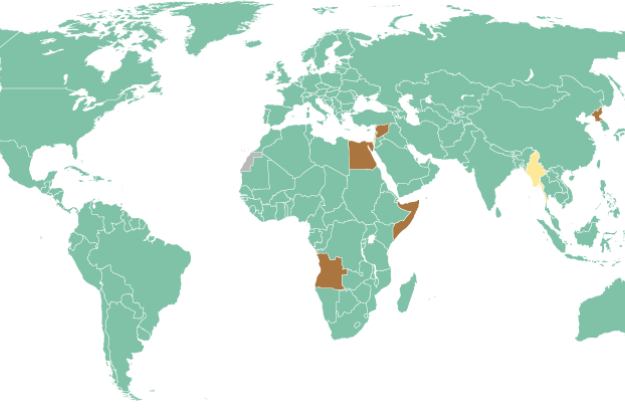
Two more countries have joined the Chemical Weapons Convention in the course of 2008, bringing the total number of States Parties to 184.
The Republic of Congo deposited its instrument of ratification on 4 December 2007 and the Convention entered into force for it on 3 January 2008. Guinea-Bissau deposited its instrument of ratification on 20 May 2008 and the Convention entered into force for it on 19 June 2008. This leaves only 11 States not Party to the Convention, of whom four are signatory States (the Bahamas, the Dominican Republic, Israel and Myanmar) and seven are non-signatory States (Angola, Democratic People’s Republic of Korea, Egypt, Iraq, Lebanon, Somalia and Syria). Iraq and Lebanon have taken important domestic steps toward joining the Convention, with the Parliamentary bodies of both States having adopted laws authorising accession to the CWC.
The Second Review Conference on the Chemical Weapons Convention, held in The Hague from 7 to 18 April 2008, reiterated that achieving universality remains a high priority for the OPCW and urged all remaining States not Party to ratify or accede to the Convention “as a matter of urgency and without preconditions, in the interests of enhancing their own national security,” as well as to affirm their commitment to global peace and security.
The Second Review Conference acknowledged the significant progress achieved in efforts to promote universal adherence. In particular, it acknowledged that of the 40 States not Party to the Convention in 2003 when the Executive Council adopted the Action Plan on Universality, more than two-thirds have joined the Convention including one possessor State. At the same time, the Conference stressed that the objectives of the Convention will not be fully realised as long as there remains even a single State not Party that could possess or acquire chemical weapons.
In this context, the Second Review Conference called upon the Technical Secretariat, the Director-General, the OPCW policy-making organs and all States Parties in a position to do so, to intensify their efforts with States not Party with a view to achieving full universality at the earliest possible date.
Since December 2007 the Technical Secretariat has conducted a number of activities aimed at promoting the universality of the CWC. A Technical Secretariat team visited Guinea-Bissau from 18 to 21 February 2008 with financial support from the European Union under its 2007 Joint Action in support of the OPCW. The visit aimed to encourage and assist authorities of Guinea-Bissau to expedite the ratification process, and to promote awareness of the Convention and the benefits it offers to States Parties.
During the visit, the Technical Secretariat team held bilateral meetings with a host of senior Guinean authorities. These included the Ministers in charge of Foreign Affairs and International Cooperation, Commerce, Justice and Interior, as well as the Vice President of the Supreme Court, Chief of Cabinet and Director of the Office of the President of the Republic, Director-General and Acting Minister for National Defence, and the Director-General in charge of Customs. A workshop for dissemination of information on the CWC and the OPCW was also held, bringing together 30 participants including experts and mid-career staff representing the Ministries of Defence, Foreign Affairs and International Cooperation, Justice, Interior and Commerce, as well as the Supreme Court and the Directorate-General of Customs.
In his continued efforts to reach out to senior officials of States not Party, the OPCW Director-General addressed correspondence to the leaders of Angola, Myanmar and Guinea-Bissau encouraging their governments to join the Convention. In June 2008 he addressed special communications to the Ministers of Foreign Affairs of the Democratic People’s Republic of Korea, Egypt, Israel, Myanmar and Syria with a view to promoting cooperation with their respective governments on matters related to the Convention. In addition, representatives of Egypt, Israel and Lebanon paid courtesy calls on the Director-General.
A number of States not Party have also participated as observers in meetings of the policy-making organs of the OPCW. Representatives of the Dominican Republic, Iraq, Israel and Lebanon attended the Twelfth Session of the Conference of the States Parties. Angola, Guinea-Bissau, Iraq, Israel and Lebanon were represented as observers at the Second Review Conference. Iraq also participated as an observer in the 52nd and 53rd sessions of the Executive Council.
